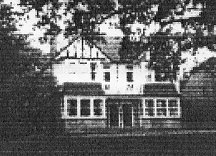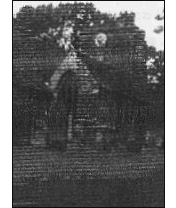|
Chapter 7.
The Final Whistle
Kenneth Hunt and his wife Charlotte,
moved to the small town of Heathfield after living in London
for nearly forty years. After the excitement of working with
young people in that busy part of the Capital and having
experienced the dangers and drama of the 'Blitz', life in
rural Sussex must have seemed a tremendous contrast. However
it was not in Kenneth Hunt's nature to allow life in
Tillsmore Rd. to stagnate, even though he was not in the
best of health.
As might be expected, he quickly settled
into the community and started to take an active part in the
life of the Church in the town. He became a ‘re1ief
preacher’ as he had been whilst at Westward Ho! three years
earlier. Within a few months he had organised a branch of
‘Toc H’, which undertook charitable work in the locality.
This strangely named organisation, which had been formed by
an Anglican Clergyman in 1922 sought to rekindle the spirit
of camaraderie experienced by men in the trenches of the
Western Front and Hunt's involvement and interest possibly
harked back to his time as a trainer of boy soldiers at
Highgate. The Heathfield branch regularly met at Hunt's
home, 'Edgehill' where Mrs. Hunt would serve them
refreshment. The branch is still in existence and continues
to perform sterling work in the area. In a very positive way
it represents an enduring tribute to Kenneth Hunt, who lived
amongst those people but for a few years, and yet served
them well
|
|

"Edgehill" Tillsmore Road, Heathfield. The
final home of Kenneth Hunt and his wife
Charlotte. |
Even though he and his wife had developed
an interest in gardening whilst living in Grindal House, he
was to spend little time tending plants and flowers at 'Edgehill'.
Together with his charity work, the allure of his old love,
football, was never far from the surface. Even in his middle
years at Highgate, his opinions and views on the sport were
much sought after and respected at the highest levels. In
the mid 1930s he had acted as an expert adviser to the F .A.
in the making of an instructional film on football training,
and this sort of involvement only increased after he had
retired from teaching in 1946.
|
| The high regard felt for Kenneth Hunt
resulted in him being elected on to the sport's governing
body.
He joined the Football Association Council as Representative
for the Amateur Football Alliance in 1946 and held this
position until his untimely death some three years later. He
was also honoured by being made the first President of an
Oxford based amateur Football Club called 'Pegasus'. The
concept of
Pegasus', the winged horse, as a symbol for the club had
been arrived at as a compromise between the Oxford symbol of
the 'Centaur', and the 'Falcon' symbol of Cambridge. |
|
Formed in 1948, Pegasus was a fairly
successful attempt to revitalise the Oxbridge Universities'
involvement in football. Established in the 'Corinthian'
mould of former years, Pegasus was made up of players who
had already represented their own Colleges, and became one
of the best amateur sides in Britain. Hunt would have been
proud to witness the team's triumphs of the 1950s, when they
won a trophy of some description every season, including the
F.A. Amateur Cup in 1951 and 1953, but sadly this was not to
be.
Kenneth Hunt passed away at his home on
the morning of the 28th of April, 1949. Although he had been
suffering from pneumonia for some time, his death was rather
sudden and unexpected, as he was only a comparatively young
sixty five years of age.
|

Waldron Parish Churchyard. Kenneth Hunt's
final resting place. |
| It is interesting to note that even on the day
before his death, Hunt had been so concerned with football that
he instructed his wife to contact the players and officials of
‘Pegasus’ regarding his views on the entry qualifications for
Club membership.
As an F.A. Council member, Kenneth Hunt had been entitled
to attend all major fixtures, and he was due to go up to
London the following day in order to watch the F.A. Cup
Final of that year. |

Kenneth Hunt's medals and International
Caps. (Wolverhampton Wanderers Collection). |
Ironically the game was between Leicester and
his old club Wolves. It almost seems as though fate had decided
that Kenneth Hunt should not witness a repeat of his old team's
triumph.
So for those few short hours after his death until the
final whistle blew at Wembley, he had the honour of being
one of the last Wolves Cup Winners, as well as being the
oldest man to represent his national team whilst remaining
an amateur. |
|
Kenneth Hunt's death was greeted by
sadness in all the places he had been involved with in the
course of his life. At Trent moving obituaries and memorial
poems appeared in the School magazine, whilst at Highgate
the obituaries were accompanied by appeals by the 'Old
Cholmeleans' for a memorial to be established in his honour.
Hunt died a very wealthy man, bequeathing
some £23,000. In his will be remembered both Trent College
and 'Toc H'. To the former he left £500 to establish a prize
in honour of his old mentor and friend the Reverend G. S.
Warner. He donated £50 to 'Toc H', payable on the death of
his widow, May, to whom the remainder of his money and
possessions went.
In Wolverhampton little attention was
given to Hunt's passing, as the town was again in the grip
of 'Cup Fever', as it had been a generation before when he
was playing for them. Hunt would have understood this, and
would have undoubtedly forgiven Wulfrunians their lack of
homage to the former hero.
Such is the fleeting and transient nature
of fame!
|

|

|

|
Return
to
Chapter 6 |
Return
to
the contents |
Proceed
to
Honours |
|